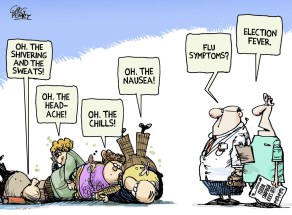First alarm rings as clock ticks on Bill 28
Read this article for free:
or
Already have an account? Log in here »
To continue reading, please subscribe:
Monthly Digital Subscription
$0 for the first 4 weeks*
- Enjoy unlimited reading on winnipegfreepress.com
- Read the E-Edition, our digital replica newspaper
- Access News Break, our award-winning app
- Play interactive puzzles
*No charge for 4 weeks then price increases to the regular rate of $19.00 plus GST every four weeks. Offer available to new and qualified returning subscribers only. Cancel any time.
Monthly Digital Subscription
$4.75/week*
- Enjoy unlimited reading on winnipegfreepress.com
- Read the E-Edition, our digital replica newspaper
- Access News Break, our award-winning app
- Play interactive puzzles
*Billed as $19 plus GST every four weeks. Cancel any time.
To continue reading, please subscribe:
Add Free Press access to your Brandon Sun subscription for only an additional
$1 for the first 4 weeks*
*Your next subscription payment will increase by $1.00 and you will be charged $16.99 plus GST for four weeks. After four weeks, your payment will increase to $23.99 plus GST every four weeks.
Read unlimited articles for free today:
or
Already have an account? Log in here »
Hey there, time traveller!
This article was published 12/09/2019 (2279 days ago), so information in it may no longer be current.
Premier Brian Pallister’s province-wide wage freeze — a key feature of his fiscal austerity plans — could be in jeopardy after an arbitrator awarded a three-year settlement to physician residents and interns that pays out increases well above zero.
Just a few days before the Pallister government was given its second majority mandate by voters, the Professional Association of Residents and Interns of Manitoba (PARIM) won an arbitrated, three-year settlement that provides wage increases of 1.5 per cent, 1.25 per cent, and 1.5 per cent, respectively. PARIM members also won increased paid sick leave, improved liability insurance coverage, and increases to stipends paid to chief and senior administrative residents.
Both the wage increases and the other gains would be prohibited under the terms of Bill 28, otherwise known as the Public Services Sustainability Act, which calls for two years of wage freeze, followed by a 0.75 per cent increase in the third year. A fourth year would move wages up by one per cent.
The problem for the Tory government is Pallister decided not to proclaim the wage-freeze law after it was passed in the legislature. Since then, he has refused to explain his decision nor discuss whether he would proclaim the bill sometime in the future.
The problem for the Tory government is Pallister decided not to proclaim the wage-freeze law after it was passed in the legislature. Since then, he has refused to explain his decision nor discuss whether he would proclaim the bill sometime in the future.
The PARIM settlement may force the premier to make a decision.
The only way to avoid paying out the higher wage increases contained in the arbitration award would be to proclaim Bill 28. However, for the time being, the province is refusing to show its hand.
A government spokesperson refused to speak directly to the arbitration award, other than acknowledging it is “part of the regular collective bargaining process for these particular parties.”
The spokesperson also said the Pallister government has “sought voluntary participation” in the wage-freeze provisions as “part of an all-hands-on-deck approach to dealing with inherited fiscal challenges.” The spokesperson would not comment specifically on the future of Bill 28: “We will continue to encourage parties to pursue collective bargaining across the entire public sector.”
The government’s response fails to acknowledge, in many instances, the province has refused to bargain at all.
Numerous unionized groups, including the Manitoba Nurses Union and Manitoba Teachers’ Society, have had little or no contact with provincial negotiators. A small number of bargaining groups have accepted the wage freeze in Bill 28– without it actually being enforced.
Numerous unionized groups, including the Manitoba Nurses Union and Manitoba Teachers’ Society, have had little or no contact with provincial negotiators. A small number of bargaining groups have accepted the wage freeze in Bill 28 — without it actually being enforced.
This meant the Pallister government was able to achieve most of the goals of Bill 28 without actually having to proclaim the law and make it easier to challenge in court.
The PARIM settlement, however, seriously undermines this strategy.
Paying PARIM members under the terms of the new contract would fly directly in the face of the government’s efforts to freeze civil servant wages, and it would create chaos at negotiating tables across the province.
It would also create friction with the handful of unions that have already settled for wage freezes, and encourage others without contracts to seek wage increases and other enhancements in excess of what is allowed under Bill 28.
Teachers in three school divisions and the Manitoba Government and General Employees’ Union, which represents 12,000 provincial civil servants, have also filed for arbitration. Although every arbitration is unique, there is every reason to believe future settlements will exceed the provisions in Bill 28.
In the PARIM settlement, the arbitrator acknowledged the lurking presence of Bill 28, but made it clear it did not have any bearing on the situation because it had not been proclaimed. In other words, arbitrators are unlikely to defer to Bill 28 on the basis that it could — some day — come into force.
The only thing clear at this time is, unless the Tory government proclaims Bill 28, PARIM members are going to get paid.

A spokeswoman for Shared Health, the provincial agency that now oversees negotiations with health-care unions, said it will fully honour the arbitrated settlement, including the provision of retroactive pay to July 2018, all within the next 60 days.
“As you know, and as the arbitration decision recognized, Bill 28 is not in force,” the spokeswoman said via email. “As the employer, Shared Health will now proceed to implement the award within the 60-day time frame outlined in the award.”
Pallister’s next move — if a move comes — will be interesting.
He could choose to proclaim Bill 28, but if he does, there is the chance the province would lose a court challenge launched by unions. If that happens, he could be on the hook for a considerable amount of retroactive pay if those bargaining groups can strike deals for more than the two-year wage freeze.
The premier could be simply waiting out the entire mess. It will take years for the legal challenge to unfold, and it is possible Pallister will simply do nothing while positioning himself as the last-line of defence against greedy unions.
It’s an image that plays well to the Tory base.
At some point, however, Pallister is going to have to find a way of settling all of the outstanding contracts with provincial civil servants. The way he responds to the PARIM arbitration will largely determine how, and when, those contracts get settled.
dan.lett@freepress.mb.ca

Born and raised in and around Toronto, Dan Lett came to Winnipeg in 1986, less than a year out of journalism school with a lifelong dream to be a newspaper reporter.
Our newsroom depends on a growing audience of readers to power our journalism. If you are not a paid reader, please consider becoming a subscriber.
Our newsroom depends on its audience of readers to power our journalism. Thank you for your support.











